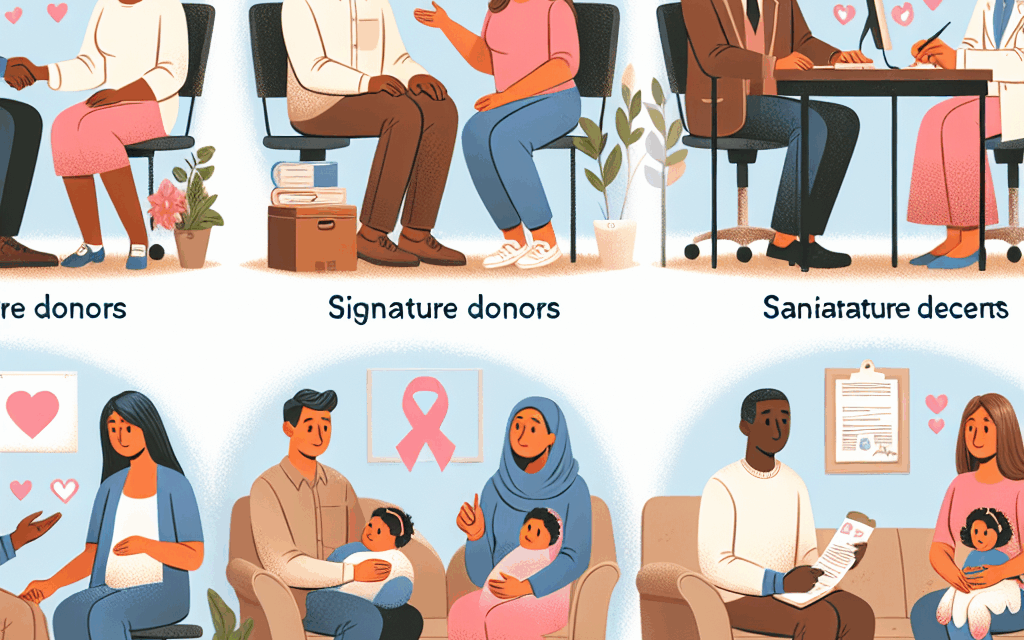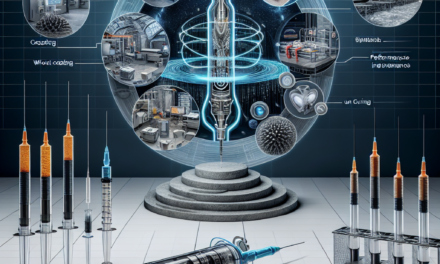Supporting Intended Parents: The Role of Signature Donors at Every Stage
In the complex journey of parenthood, many individuals and couples face challenges that can make the dream of having children seem daunting. For those who turn to assisted reproductive technologies, the role of donors—whether for eggs, sperm, or embryos—becomes crucial. Among these donors, “signature donors” stand out as individuals who not only provide biological material but also offer emotional and psychological support throughout the process. This article explores the multifaceted role of signature donors in supporting intended parents at every stage of their journey, from initial considerations to the post-birth experience.
Understanding the Concept of Signature Donors
Signature donors are individuals who go beyond the traditional role of a donor. They are often characterized by their commitment to supporting intended parents not just biologically but also emotionally and psychologically. This section delves into the definition, characteristics, and importance of signature donors in the context of assisted reproduction.
Defining Signature Donors
Signature donors are typically individuals who have undergone a rigorous selection process to ensure they are not only physically suitable for donation but also emotionally invested in the process. Unlike anonymous donors, signature donors often maintain a relationship with the intended parents, providing a sense of connection and support.
- Emotional Investment: Signature donors are often motivated by a desire to help others achieve their dreams of parenthood.
- Open Communication: They are willing to engage in open dialogue with intended parents, fostering a supportive environment.
- Long-term Commitment: Many signature donors are prepared to be involved throughout the entire process, from conception to birth and beyond.
The Importance of Signature Donors
The role of signature donors is increasingly recognized as vital in the assisted reproduction landscape. Their involvement can significantly impact the emotional well-being of intended parents, providing reassurance and support during a time that can be fraught with anxiety and uncertainty.
- Reducing Anxiety: Knowing that they have a supportive donor can alleviate some of the stress associated with the fertility process.
- Building Trust: A relationship with a signature donor can foster trust, which is essential for a successful partnership.
- Enhancing Outcomes: Studies suggest that emotional support can lead to better outcomes in assisted reproductive technologies.
The Initial Stages: Finding the Right Signature Donor
The journey to parenthood begins with the search for the right donor. This stage is critical, as it sets the tone for the entire experience. In this section, we will explore how intended parents can find and select a signature donor who aligns with their values and needs.
Identifying Needs and Preferences
Before embarking on the search for a signature donor, intended parents must first identify their needs and preferences. This involves a deep reflection on what qualities they seek in a donor, as well as their own emotional readiness for the journey ahead.
- Genetic Considerations: Some intended parents may prioritize genetic traits, such as physical appearance or intelligence.
- Emotional Compatibility: Finding a donor whose values and personality align with those of the intended parents is crucial.
- Willingness to Communicate: Intended parents should consider how much interaction they desire with the donor throughout the process.
Utilizing Donor Agencies and Platforms
Once needs and preferences are established, intended parents can turn to donor agencies and online platforms that specialize in connecting donors with recipients. These resources often provide extensive profiles of potential donors, including medical histories, personal stories, and even photographs.
- Reputable Agencies: It is essential to choose agencies that are well-reviewed and have a track record of successful matches.
- Comprehensive Profiles: Look for platforms that offer detailed profiles, including psychological evaluations and personal narratives.
- Support Services: Some agencies provide counseling and support services to help intended parents navigate their choices.
Engaging in Open Dialogue
Once potential signature donors are identified, engaging in open dialogue is crucial. This stage allows intended parents to assess compatibility and establish a rapport with the donor.
- Initial Meetings: Face-to-face or virtual meetings can help both parties gauge their comfort levels and establish a connection.
- Discussing Expectations: Clear communication about expectations, boundaries, and involvement is essential for a successful partnership.
- Addressing Concerns: Intended parents should feel free to express any concerns or questions they may have about the process.
The Medical Process: Navigating Fertility Treatments
Once a signature donor is selected, the next stage involves navigating the medical aspects of fertility treatments. This section will explore how signature donors can support intended parents during this often challenging phase.
Understanding the Medical Procedures
Assisted reproductive technologies encompass a range of medical procedures, including in vitro fertilization (IVF), intrauterine insemination (IUI), and egg or sperm donation. Understanding these procedures is crucial for intended parents as they prepare for the journey ahead.
- In Vitro Fertilization (IVF): A process where eggs are fertilized by sperm outside the body and then implanted in the uterus.
- Intrauterine Insemination (IUI): A less invasive procedure where sperm is directly inserted into the uterus during ovulation.
- Egg and Sperm Donation: Involves using donated eggs or sperm to achieve pregnancy.
The Role of Signature Donors During Medical Procedures
Signature donors can play a supportive role during medical procedures, helping to ease the emotional burden on intended parents. Their involvement can take various forms, from providing encouragement to being present during appointments.
- Emotional Support: Signature donors can offer reassurance and encouragement during medical appointments and procedures.
- Accompanying to Appointments: Some intended parents may appreciate having their donor present during key medical appointments.
- Sharing Experiences: Donors can share their own experiences and insights, helping to demystify the process for intended parents.
Addressing Emotional Challenges
The medical process can be emotionally taxing for intended parents. Signature donors can help address these challenges by providing a listening ear and emotional support.
- Encouraging Open Communication: Donors can encourage intended parents to express their feelings and concerns throughout the process.
- Providing Resources: Sharing resources such as support groups or counseling services can be beneficial for intended parents.
- Being Present: Simply being there for intended parents during difficult moments can make a significant difference.
The Journey to Parenthood: Preparing for Birth
As intended parents approach the final stages of their journey, preparation for birth becomes paramount. This section will explore how signature donors can support intended parents during this critical time.
Creating a Birth Plan
A birth plan outlines the preferences and wishes of intended parents regarding the birthing process. Signature donors can play a role in helping to create a comprehensive birth plan that reflects the desires of all parties involved.
- Discussing Preferences: Signature donors can engage in discussions about preferences for labor and delivery, including pain management options.
- Involvement in the Birth: Some intended parents may wish for their donor to be present during the birth, which should be discussed openly.
- Contingency Plans: Preparing for unexpected situations, such as complications during delivery, is essential for all parties.
Emotional Support Leading Up to Birth
The weeks leading up to birth can be filled with anticipation and anxiety. Signature donors can provide emotional support during this time, helping to ease fears and build excitement.
- Regular Check-ins: Maintaining regular communication can help intended parents feel supported and connected.
- Encouraging Self-Care: Donors can encourage intended parents to prioritize self-care and relaxation as they prepare for birth.
- Sharing Positive Stories: Sharing positive birth stories can help alleviate fears and build confidence in the process.
Post-Birth Support
After the birth of a child, the role of signature donors does not end. They can continue to provide support to intended parents as they navigate the early days of parenthood.
- Offering Practical Help: Signature donors can offer practical assistance, such as helping with household tasks or providing meals.
- Emotional Check-ins: Regular emotional check-ins can help intended parents process their feelings and experiences.
- Encouraging Bonding: Donors can encourage intended parents to focus on bonding with their newborn during this critical time.
Long-term Relationships: Maintaining Connections Post-Birth
The relationship between intended parents and signature donors can evolve after the birth of a child. This section explores how to maintain connections and foster a supportive relationship in the long term.
Establishing Boundaries
As the relationship evolves, it is essential to establish clear boundaries that respect the roles of both intended parents and signature donors. Open communication about these boundaries is crucial for maintaining a healthy relationship.
- Defining Roles: Clearly defining the roles of each party can help prevent misunderstandings and conflicts.
- Respecting Privacy: Both parties should respect each other’s privacy and personal space as they navigate their new roles.
- Regular Check-ins: Scheduling regular check-ins can help both parties stay connected while respecting boundaries.
Celebrating Milestones Together
Celebrating milestones, such as birthdays or significant achievements, can strengthen the bond between intended parents and signature donors. These shared experiences can create lasting memories and foster a sense of community.
- Joint Celebrations: Organizing joint celebrations can help maintain a sense of connection and shared joy.
- Creating Traditions: Establishing traditions that involve both parties can enhance the relationship and create lasting memories.
- Sharing Updates: Regularly sharing updates about the child’s growth and development can keep the connection alive.
Providing Ongoing Support
The journey of parenthood is ongoing, and signature donors can continue to provide support as intended parents navigate the challenges and joys of raising a child.
- Offering Guidance: Signature donors can offer guidance and advice based on their own experiences, helping intended parents feel less alone.
- Being a Resource: Donors can serve as a resource for information and support as intended parents face new challenges.
- Encouraging Open Communication: Maintaining open lines of communication can help both parties feel supported and connected.
Conclusion
The journey to parenthood is a deeply personal and often challenging experience. For many intended parents, the support of signature donors can make a significant difference at every stage of this journey. From the initial search for a donor to navigating medical procedures, preparing for birth, and maintaining long-term relationships, signature donors play a vital role in providing emotional and psychological support.
As the landscape of assisted reproduction continues to evolve, the importance of signature donors will only grow. Their unique ability to connect with intended parents on a personal level fosters a sense of community and shared purpose, ultimately enhancing the experience of bringing new life into the world. By understanding the multifaceted role of signature donors, intended parents can navigate their journey with greater confidence and support, paving the way for a fulfilling and joyful experience of parenthood.





